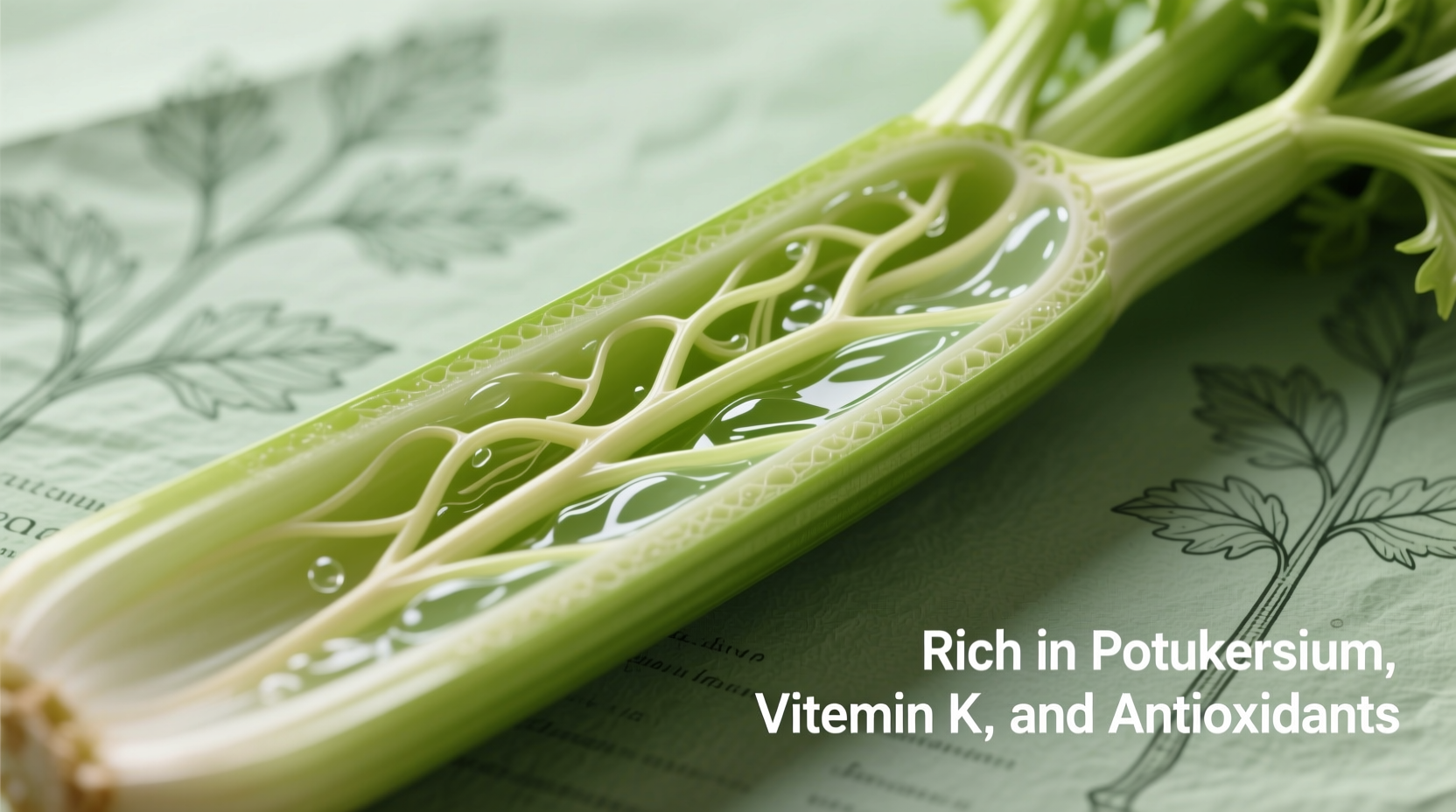Curious about what makes celery a staple in health-conscious diets? This comprehensive guide breaks down exactly what nutrients you get from celery, how they benefit your body, and how celery compares to other vegetables in nutritional value. Whether you're meal planning, managing specific health concerns, or simply curious about this crunchy vegetable, you'll discover science-backed information to make informed dietary choices.
The Complete Nutritional Profile of Celery
When analyzing celery's nutritional composition, the USDA FoodData Central database provides the most reliable reference. A standard one-cup (101g) serving of chopped celery delivers:
| Nutrient | Amount per Cup (101g) | % Daily Value |
|---|---|---|
| Calories | 16 | 1% |
| Carbohydrates | 3g | 1% |
| Fiber | 1.6g | 6% |
| Vitamin K | 32mcg | 14% |
| Vitamin A | 453IU | 10% |
| Vitamin C | 5.1mg | 9% |
| Potassium | 260mg | 8% |
| Folate | 36.4mcg | 9% |
This impressive nutrient profile comes with minimal calories, making celery an excellent choice for those watching their weight while still wanting nutrient-dense foods. The fiber content supports digestive health, while the combination of vitamins and minerals contributes to multiple bodily functions.
Key Health Benefits Backed by Research
Celery's nutritional value extends beyond basic vitamins and minerals. Research published in the journal Phytotherapy Research identifies several bioactive compounds in celery that contribute to health benefits:
- Apigenin - A flavonoid with demonstrated anti-inflammatory properties that may support brain health
- Luteolin - Another flavonoid showing potential in reducing oxidative stress
- Phthalides - Compounds that may help lower blood pressure by relaxing artery walls
A 2020 review in Nutrients examined multiple studies on celery consumption and found consistent evidence that regular consumption supports cardiovascular health through multiple mechanisms, including blood pressure regulation and cholesterol management.
How Celery Compares to Other Common Vegetables
Understanding where celery stands nutritionally compared to similar vegetables helps make informed dietary choices. This comparison shows how celery stacks up against carrots and cucumbers per 100g serving:
| Nutrient | Celery | Carrots | Cucumbers |
|---|---|---|---|
| Calories | 14 | 41 | 15 |
| Vitamin K (mcg) | 29.6 | 13.2 | 16.4 |
| Vitamin A (IU) | 449 | 16,706 | 105 |
| Vitamin C (mg) | 3.1 | 5.9 | 2.8 |
| Potassium (mg) | 260 | 320 | 147 |
| Fiber (g) | 1.6 | 2.8 | 0.5 |
As shown in this comparison, celery stands out for its extremely low calorie count while providing respectable amounts of vitamin K and potassium. Carrots contain significantly more vitamin A, while cucumbers have less fiber but similar hydration properties.
Maximizing Nutrient Absorption from Celery
To get the most nutritional value from celery, consider these evidence-based preparation techniques:
- Eat with healthy fats - The fat-soluble vitamins in celery (A, E, K) absorb better when consumed with healthy fats like olive oil or avocado
- Leave the strings intact - The fibrous strings contain valuable nutrients; peeling reduces nutritional value
- Store properly - Keep celery in an airtight container with a damp paper towel to maintain crispness and nutrient retention
- Use the leaves - Celery leaves contain higher concentrations of certain nutrients than the stalks

Contextual Benefits: When Celery Nutrition Matters Most
Celery's specific nutrient profile makes it particularly beneficial in certain health contexts:
- Hydration support - With 95% water content, celery helps maintain hydration levels, especially valuable during hot weather or after exercise
- Blood pressure management - The potassium and phthalides work together to support healthy blood pressure levels
- Bone health maintenance - The vitamin K content supports calcium absorption and bone mineralization
- Digestive health - The fiber content promotes regular bowel movements and feeds beneficial gut bacteria
According to the National Institutes of Health Office of Dietary Supplements, vitamin K deficiency affects approximately 15-20% of the adult population, making celery's contribution to this nutrient particularly valuable for many people.
Addressing Common Misconceptions About Celery Nutrition
Several myths persist about celery's nutritional value. Let's examine the facts:
- "Celery has negative calories" - While celery is extremely low in calories, the thermic effect of digestion doesn't actually create a calorie deficit. The concept of "negative calories" is a nutritional myth.
- "Celery juice is significantly more nutritious than whole celery" - Juicing removes valuable fiber and concentrates sugars. Whole celery provides more complete nutrition.
- "Celery lacks significant nutrients" - While not as nutrient-dense as some vegetables, celery provides meaningful amounts of several essential nutrients, particularly when consumed regularly as part of a balanced diet.
The Academy of Nutrition and Dietetics emphasizes that all vegetables contribute to overall health, and variety matters more than focusing on any single "superfood."
Practical Ways to Incorporate More Celery Into Your Diet
Looking to increase your celery consumption? Try these practical approaches:
- Add chopped celery to tuna or chicken salads instead of mayonnaise-heavy versions
- Use celery sticks as a vehicle for healthy dips like hummus or Greek yogurt-based spreads
- Include celery in vegetable-based soups and stews for added flavor and nutrients
- Blend celery leaves into smoothies for a nutrient boost without altering flavor significantly
- Substitute celery for higher-calorie crunch elements in sandwiches and wraps
Remember that dietary patterns matter more than individual foods. The Dietary Guidelines for Americans 2020-2025 recommend consuming a variety of vegetables across all subgroups, including celery as part of your overall vegetable intake.











 浙公网安备
33010002000092号
浙公网安备
33010002000092号 浙B2-20120091-4
浙B2-20120091-4